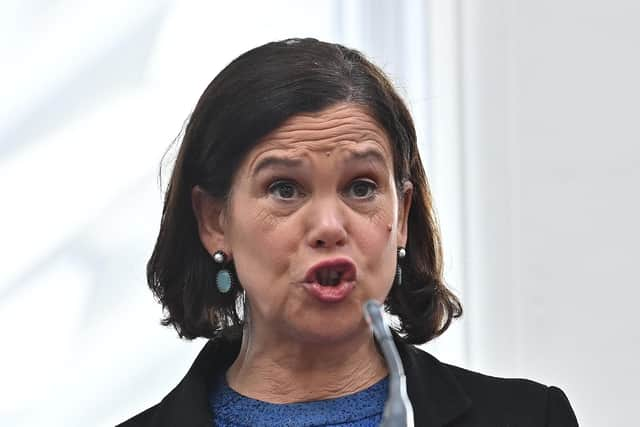Sinn Fein President Mary Lou McDonald in press freedom row over libel action against RTE
and live on Freeview channel 276
The Index on Censorship, a London-based organisation that campaigns for global press freedom, filed a ‘media freedom alert’ to the Council of Europe’s ‘Safety of Journalists Platform’.
The COE is an international organisation in Strasbourg comprising 46 countries set up to promote democracy and protect human rights and the rule of law in Europe.
Advertisement
Hide AdAdvertisement
Hide AdThe COE published the alert yesterday headlined, ‘Sinn Fein leader files SLAPP against RTE’.


A SLAPP is a ‘Strategic Lawsuit Against Public Participation’ which the European Commission recently described as a “serious threat to democracy and fundamental rights, such as freedom of expression and information”.
The COE website tagged the case as ‘Harassment and Intimidation of Journalists’, with the “source of threat” classed as “non-state”.
The move is in relation to a High Court writ filed by Mary Lou McDonald against RTE on 25 April 2022.
Advertisement
Hide AdAdvertisement
Hide AdThe litigation relates to an RTE Radio 1 broadcast on 16 February about controversy around the politicians who had been invited - and not invited - to speak at a National Women’s Council of Ireland rally ahead of International Women’s Day on 8 March, the COE said.
“McDonald was one of the politicians who was invited to speak at the rally, but she did not speak on the radio segment,” the alert said. “During the broadcast, the RTÉ journalist referred to the historic handling of sexual abuse allegations by Sinn Féin and the Irish Republican Army (IRA). Victims of the abuse were not interviewed but have long been outspoken about the republican leadership’s mishandling of the abuse allegations.
“This is the third time McDonald has taken High Court defamation proceedings since 2014 and the second relating to reports about the historic handling of sexual abuse allegations by Sinn Féin and the IRA.”
The Index on Censorship said: “We are alarmed at the legal action that has been filed against RTÉ by the Sinn Féin leader Mary Lou McDonald as we believe the action is characteristic of a Strategic Lawsuit Against Public Participation or ‘SLAPP’.
Advertisement
Hide AdAdvertisement
Hide Ad“We identify SLAPPs through some key hallmarks, but fundamentally they involve powerful people making legal threats or taking legal actions against public watchdogs - such as media outlets - in response to public interest speech that may be inconvenient to them or their interests.
“Politicians are elected by citizens; they and their actions must therefore be subject to public scrutiny. Lawsuits that discourage or prevent discussions that are in the public interest can have a serious and damaging impact on media freedom and on our democracies.”
Mary Lou McDonald was invited to comment.
COE ALERTS EXPLAINED
The COE has categorised the action as a ‘Level 2’ alert, which it says may include but is not limited to “physical assaults, acts of intimidation and harassment; use by public figures of threatening or severely abusive language towards media members; unwarranted seizure or damage to property or equipment; laws and regulations that unduly restrict media freedom or access to information; actions that jeopardise the confidentiality of sources or the independence of the public sector broadcasters; abusive or disproportionate use of legislation; misuse of governmental or other powers to direct media content or to penalise media or journalists; interference with media freedom through ownership, control and regulation; and other acts posing a serious threat to media freedom, offline or online”.
A Level 1 Alert - which McDonald is not accused of - covers the most severe and damaging violations of media freedom, including but not limited to murder, assassination or direct threat to the life of journalists, physical assaults, impunity for any such violations; prolonged arbitrary detention, arbitrary closure of a media enterprise or and any other acts posing a grave threat to media freedom.
EUROPEAN COMMISSION ACTION AGAINST ‘SLAPPS’
Advertisement
Hide AdAdvertisement
Hide AdLast month the European Union’s executive arm said it wants to see the EU adopt a law to protect journalists and civil rights activists from lawsuits aimed at censoring them.
The European Commission proposed safeguards to curb strategic lawsuits against public participation (SLAPPS).
It described such litigation as a “serious threat to democracy and fundamental rights, such as freedom of expression and information”.
Daphne Caruana Galizia, a Maltese investigative journalist who was killed in a 2017 car bombing, faced more than 40 lawsuits when she was killed, the commission said.
Advertisement
Hide AdAdvertisement
Hide AdThe proposed law would allow courts to dismiss cases early in the proceedings and puts the burden of proof on the parties bringing lawsuits “to prove that the case is not manifestly unfounded”, the commission said.
The suing parties would bear all procedural costs, including the fees of defence lawyers, if a case is dismissed as abusive.
Individuals targeted by Slapps would also be eligible for compensatory damages.
“The anti-Slapp directive proposed by the European Commission today is a major step forward in the fight against the use of ‘gag suits’ to intimidate and silence journalists,” media freedom organisation Reporters Without Borders said.
Advertisement
Hide AdAdvertisement
Hide AdTo take effect, the proposal needs approval from EU member countries and from legislators in the European Parliament.
The directive covers Slapps in civil matters with cross-borders implications since the EU is not empowered to legislate on strictly national matters.
The commission is recommending that member countries apply the proposed rules at the national level.
According to the commission, 439 physical and legal attacks against journalists and media workers took place in 24 EU countries last year.
MORE NEWS: